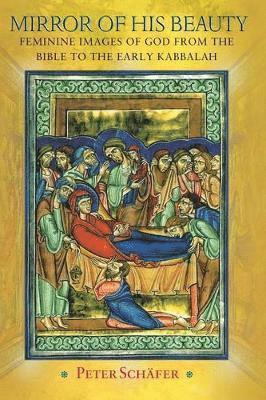
- Format
- Häftad (Paperback / softback)
- Språk
- Engelska
- Antal sidor
- 328
- Utgivningsdatum
- 2004-10-01
- Upplaga
- New e.
- Utmärkelser
- Winner of Association of American Publishers' Best New Book in Philosophy and Religion 2003
- Förlag
- Princeton University Press
- Originalspråk
- English
- Illustratör/Fotograf
- 15 halftones 1 illustr
- Illustrationer
- 15 halftones. 1 line illus.
- Dimensioner
- 227 x 152 x 20 mm
- Vikt
- Antal komponenter
- 1
- Komponenter
- 149:B&W 6.14 x 9.21 in or 234 x 156 mm (Royal 8vo) Perfect Bound on Creme w/Gloss Lam
- ISBN
- 9780691119809
- 460 g
Mirror of His Beauty
Feminine Images of God from the Bible to the Early Kabbalah
- Skickas från oss inom 5-8 vardagar.
- Fri frakt över 249 kr för privatkunder i Sverige.
Passar bra ihop
De som köpt den här boken har ofta också köpt Discourses and Selected Writings av Epictetus, Robert Dobbin (häftad).
Köp båda 2 för 568 krKundrecensioner
Fler böcker av Peter Schfer
-
Jesus in the Talmud
Peter Schfer
-
The Hidden and Manifest God
Peter Schfer
-
The History of the Jews in the Greco-Roman World
Peter Schfer
-
Judeophobia
Peter Schfer
Recensioner i media
Winner of the 2002 Award for Best Professional/Scholarly Book in Religion, Association of American Publishers Peter Schafer, Winner of the 2007 Distinguished Achievement Award from the Andrew W. Mellon Foundation "This work deals with esoteric ideas that are bold and complex, but it is also culturally important, providing a wonderful antecedent for feminist theological speculation today. Schafer supports his thesis admirably, showing its importance for understanding medieval Jewish-Christian relationships and the cultural environment's influence on religion."--Library Journal "Schafer's book is clearly written and forcefully presents an interesting and plausible thesis for the presence, survival and re-emergence of the feminine in the Jewish divine from antiquity to the middle ages."--Tal Ilan, Journal of Jewish Studies
Övrig information
Peter Schafer is Professor of Religion and Ronald O. Perelman Professor of Jewish Studies at Princeton University as well as University Professor of Jewish Studies and Director of the Institut fur Judaistik at Freie Universitat Berlin. His last book was "Judeophobia: Attitudes toward the Jews in the Ancient World".
Innehållsförteckning
List of Figures xi Acknowledgments xiii Abbreviations xv Introduction 1 PART I. FROM THE BIBLE TO THE BAHIR Chapter 1. Lady Wisdom 19 Job: Wisdom Cannot Be Found 19 Proverbs: Wisdom as God's Little Daughter and His Embodiment on Earth 23 Jesus Sirach: Wisdom as God's Torah 29 Wisdom of Solomon: Wisdom as the Medium of Divine Energy and God's Beloved Spouse 33 Chapter 2. Philo's Wisdom 39 God and His Wisdom 40 Wisdom and Logos 41 Wisdom's Gender 45 God's Daughter 48 Divine and Human Wisdom 50 Summary-and Once Again Gender 54 Chapter 3. The Gnostic Drama 58 The Creation Myth According to the Apocryphon of John 60 Barbelo 61 The Self-Generated/Christ 64 Sophia and Her Offspring 65 Sophia's Descent 68 Sophia and Barbelo 69 The Valentinian Creation Myth According to Irenaeus 73 Passionate Sophia 74 Sophia and Achamoth, Upper and Lower Wisdom 76 Chapter 4. The Rabbinic Shekhinah 79 Wisdom 79 God the Only Creator 81 Israel, God's Spouse, Daughter, Sister, and Mother 83 Shekhinah 86 Personification of the Shekhinah 93 Chapter 5. The Shekhinah of the Philosophers 103 Saadia Gaon 104 Judah ben Barzillai of Barcelona 107 Judah ha-Levi 110 Moses Maimonides 113 Chapter 6. The Shekhinah in the Bahir 118 The Ten Sefirot 120 Sexual Symbolism 123 The Position of the Shekhinah in the Sefirotic System 125 Mediatrix between Heaven and Earth 128 PART II. THE QUEST FOR ORIGINS Chapter 7. Gnosis 137 Chapter 8. Christianity 147 Eastern Church 148 Western Church 152 Peter Damian 153 Herman of Tournay 155 Bernard of Clairvaux 157 Godfrey of Admont 162 Hildegard of Bingen 163 Peter of Blois 169 Mary and the Shekhinah 169 Chapter 9. Counter-Evidence: Mary and the Jews 173 Anti-Jewish Legends and Images 173 The Jews Disturb Mary's Funeral 173 The Image of Mary in the Latrine 191 The Jewish Boy in the Furnace 197 Jewish Polemics against Mary 209 Rabbinical Evidence and Toledot Yeshu 209 The Apocalypse of Zerubbavel 212 Chapter 10. How Much "Origins," Or: The Anxiety of Influence 217 Mythical Origin 218 Femininity 224 Influence 229 History 235 Notes 245 Bibliography 289 Index 301
Du kanske gillar
-
Meditations
Marcus Aurelius
Inbunden -
Meditations
Marcus Aurelius
Häftad


